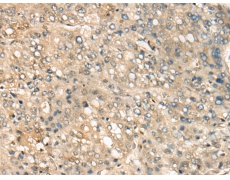中文名称: 兔抗BBS10多克隆抗体
|
Background: |
This gene is a member of the Bardet-Biedl syndrome (BBS) gene family. Bardet-Biedl syndrome is an autosomal recessive disorder characterized by progressive retinal degeneration, obesity, polydactyly, renal malformation and mental retardation. The proteins encoded by BBS gene family members are structurally diverse and the similar phenotypes exhibited by mutations in BBS gene family members is likely due to their shared roles in cilia formation and function. Many BBS proteins localize to the basal bodies, ciliary axonemes, and pericentriolar regions of cells. BBS proteins may also be involved in intracellular trafficking via microtubule-related transport. The protein encoded by this gene is likely not a ciliary protein but rather has distant sequence homology to type II chaperonins. As a molecular chaperone, this protein may affect the folding or stability of other ciliary or basal body proteins. Inhibition of this protein's expression impairs ciliogenesis in preadipocytes. Mutations in this gene cause Bardet-Biedl syndrome type 10. |
|
Applications: |
ELISA, WB, IHC |
|
Name of antibody: |
BBS10 |
|
Immunogen: |
Fusion protein of human BBS10 |
|
Full name: |
Bardet-Biedl syndrome 10 |
|
Synonyms: |
C12orf58 |
|
SwissProt: |
Q8TAM1 |
|
ELISA Recommended dilution: |
5000-10000 |
|
IHC positive control: |
Human liver cancer |
|
IHC Recommend dilution: |
30-150 |
|
WB Predicted band size: |
81 kDa |
|
WB Positive control: |
PC-3,A172 and HEPG2 cell lysates |
|
WB Recommended dilution: |
200-1000 |


 购物车
购物车 帮助
帮助
 021-54845833/15800441009
021-54845833/15800441009
